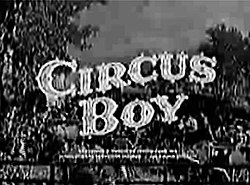Circus Boy
| Circus Boy | |
|---|---|

Title screen
|
|
| Genre | Children/Family Adventure/Drama |
| Written by | See Episode List |
| Directed by |
George Archainbaud William Beaudine Fred Jackman, Jr. Robert G. Walker Douglas Heyes Lew Landers |
| Starring |
Mickey Braddock (Micky Dolenz) Noah Beery, Jr. Robert Lowery Bimbo the Elephant |
| Theme music composer |
Hal Hopper and Victor McLeod |
| Country of origin | United States |
| Original language(s) | English |
| No. of seasons | 2 |
| No. of episodes | 49 |
| Production | |
| Producer(s) | Norman Blackburn and Herbert B. Leonard |
| Running time | 24–26 minutes |
| Production company(s) | Norbert Productions Screen Gems Television |
| Distributor | Columbia TriStar Domestic Television (2001) Sony Pictures Television |
| Release | |
| Original network |
NBC (1956–1957) ABC (1957–1958) |
| Picture format | Black-and-white |
| Audio format | Monaural |
| Original release | September 23, 1956 – December 12, 1957 |
Circus Boy is an American action/adventure/drama series that aired in prime time on NBC, and then on ABC, from 1956 to 1958. It was then rerun by NBC on Saturday mornings, from 1958 to 1960.
Set in the late 1890s, the title of the series refers to a boy named Corky. After his parents, "The Flying Falcons," were killed in a trapeze accident, young Corky (Micky Dolenz – billed at the time as Mickey Braddock) was adopted by Joey the Clown (Noah Beery, Jr.), and the whole Burke and Walsh Circus family.
The young boy quickly found a role with the circus as water boy to Bimbo, a baby elephant whom Corky would come to consider his pet. Riding Bimbo's back, Corky dealt with adolescent problems, and helped the show's adults including Joey, owner/promoter Big Tim Champion (Robert Lowery). and head canvasman Pete (Guinn Williams), keep the circus successful as the traveling show moved from town to town each week.
Outside of an elephant being the animal companion, the series was similar to popular "boy and his dog" shows of the time, such as Lassie/Jeff's Collie, and The Adventures of Rin Tin Tin.
The following cast appeared in the debut episode only. Several sources erroneously list these three, as well as Billy Barty from Episodes 1 and 2, as series regulars.
Between 1956 and 1957 Dan Spiegle adapted the show into a comic book, published by Dell Comics.
...
Wikipedia
